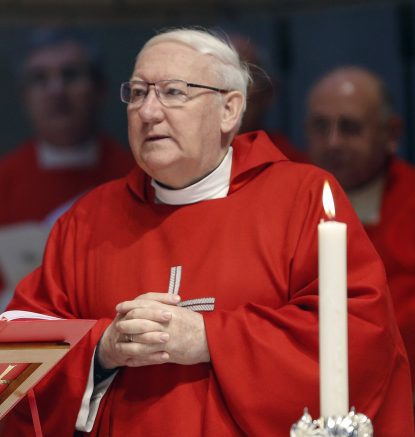
Bishop Brian Farrell, secretary of the Pontifical Council for Promoting Christian Unity, is pictured in a Jan. 29, 2017, photo. (CNS photo/Giampiero Sposito)
VATICAN CITY (CNS) — The pandemic lockdowns and travel restrictions have had an impact on the Catholic Church’s relationships with other Christian churches, but the effects were not all bad.
Around the globe, Christians of different denominations have and continue to practice what Pope Francis has called the “ecumenism of charity,” working together to care for the sick, support the mourning and feed the hungry.
And the boom of online liturgies and conferences have given many Christians greater opportunities to participate in the worship and liturgies of their Christian neighbors and to “attend” online conferences and workshops with them.
For many people, the 2021 Week of Prayer for Christian Unity Jan. 18-25 will be another occasion of virtual ecumenical prayer.
But while the number of attendees will be extremely limited because of the pandemic, Pope Francis still plans to close the week by presiding over an ecumenical evening prayer service at Rome’s Basilica of St. Paul Outside the Walls. Most people will watch online.
But all relationships require face time, and that goes for the Catholic Church’s relationships with other Christian churches as well, said Bishop Brian Farrell, secretary of the Pontifical Council for Promoting Christian Unity.
[hotblock]
The COVID-19 precautions meant that dozens of ecumenical meetings over the past year were moved online.
“We find that video conferencing is very good for organizational, practical meetings, but makes ecumenical dialogue much more difficult in effect, because in dialogue you need the back and forth of exchange and discussion and reaction, which is very difficult on video,” the bishop said.
The official theological dialogues of the Catholic Church and its ecumenical partners usually involve research and work in small groups before the theologians and church leaders meet in person over the course of several days. Those meetings include prayer and formal sessions, but also meals and time for relaxing together.
The informal moments and opportunities for conversation are very important, Bishop Farrell said, because “you can thrash out problems, you can overcome doubts” and really get to know the theologians representing the churches.
Staff of the pontifical council missed those real connections, he said, but postponing most of their travel also gave them an opportunity to devote more time to special projects: In December the council published “The Bishop and Christian Unity: An Ecumenical Vademecum”; work is progressing on a summary of what ecumenical documents say about topics such as the sacramentality of the church or ministry in the church; and “remote preparation” has begun for the celebration in 2025 of the 17th centenary of the First Ecumenical Council of Nicea, which “is fundamental for all Christians because it settled Christological questions and gave us the Creed.”
In addition to the Week of Prayer, two upcoming events have significant ecumenical aspects, Bishop Farrell said, referring to the Catholic Church’s celebration Jan. 24 of the Sunday of the Word of God and Pope Francis’ planned trip to Iraq in March.
Reading, studying and praying with the Scriptures “is fundamental to ecumenical life,” because it is fundamental in the life of every Christian, Bishop Farrell said.
“We have to read the Scriptures and we have to be familiar with them, because this is God’s revelation and the foundation of everything that we are,” he said. “In the past, there was a kind of hesitancy to encourage Catholics to read the Bible but that belongs to a different era, which we have overcome.”
The pope’s possible trip to Iraq March 5-8 will have obvious ecumenical importance, and not only because Catholic and Oriental Orthodox Christians live side by side there and for decades have been committed to promoting Christian unity.
“It’s the pope’s desire to be close to those who have really suffered, and everybody knows that Christians in in that area of the world and, in particular in Iraq, have undergone tremendous suffering in recent times and in recent decades,” Bishop Farrell said. “It will certainly be an ecumenical journey insofar as he will meet members of other churches, visiting a country where there is very normal and ordinary collaboration between all the Christians. They stand together.”
PREVIOUS: Rome university reverses decision to honor Father Pavone
NEXT: ‘For the love of God, send us oxygen,’ plead bishops in Brazil’s Amazon


Share this story